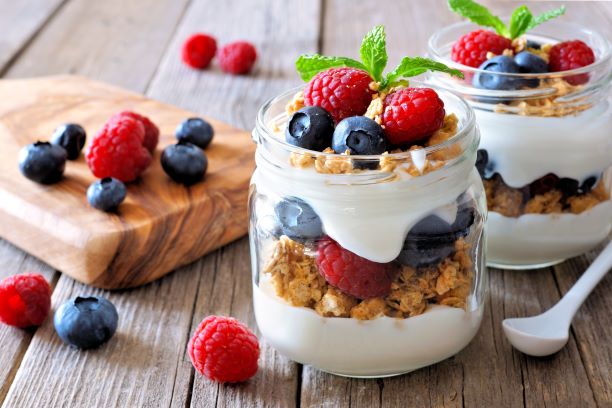
The secret of beauty and long life – yoghurt
Yogurt is one of the oldest foods of mankind and one of the most popular dairy products.
Yogurt has a thousand-year history. Its origin dates back to 3,000 BC, when milk was transported in goat skin and milk was fermented in the presence of suitable bacteria and heat, and people found that such a product is even tastier than milk. It came to Europe from Bulgaria. Well-known biologist and scientist from Russia, Professor Ilja Iljič Mečnikov came up with the idea that the longevity of Bulgarian shepherds lies in their eating habits and was the first to identify in fermented milk two strains of bacteria that are important to our health, slow down aging and increase the body’s defenses. “Yogurt will change the natural, neutral environment in the intestines to acidic, in which microbes causing intestinal infection are much more difficult to reproduce.” The acclaimed professor Mečnikov was awarded the Nobel Prize in 1908 for his research into the immune system.
In Europe, Danone is the first to start industrial yoghurt production, which is still on the market today.
Yogurt is an acid-milk product characterized by yogurt cultures of Lactobacillus delbrueckii subsp. bulgaricus and Streptococcus thermophilus. It is these bacteria that convert milk sugar – lactose n and lactic acid, which is the basis for the formation of yogurt. According to the Codex Alimentarius recommendation, yogurt should not undergo heat treatment after the acidification process, as beneficial bacteria will be destroyed. Only products that have not undergone heat treatment after the acidification process, contain no preservatives and are produced by the fermentation of milk, cream or buttermilk, contain at least 10 million micro-organisms per gram at the end of their shelf life, should be called Yoghurt. However, not all European countries respect this Code.
The unique consistency and taste of yogurt lies in the fermentation of lactose, where lactic acid is produced, which causes the precipitation of milk proteins.
Health benefits
Milk and dairy products are the basis for quality human nutrition. They contain almost all important nutrients such as proteins, carbohydrates and lipids, plus vitamins and minerals. One medium-sized yogurt 245 g contains up to 49% of the recommended daily dose of calcium, 38% of the recommended daily dose of phosphorus, 12% of the recommended daily dose of magnesium and 18% of the recommended daily dose of potassium. It also contains a number of B vitamins, especially B12 and B2, which protect against cardiovascular diseases. Yogurt naturally does not contain important vitamin D and is therefore added artificially.
National Yoghurt Association – an American non-profit organization representing producers and sellers of yogurt products, has organized an expert meeting to evaluate the effects of live yoghurt cultures on the health and lifestyle of the population. According to the experts involved, the health benefits are mainly:
- An excellent source of calcium that is important for bone growth and development at all stages of life, especially in children. It has an important role in the prevention of osterporosis
- Good protein source. One portion of about 150 g covers an average of 20% of the daily protein dose
- Beneficial effects on the immune system
- Thanks to the presence of LAC milk cultures, yoghurt can also be consumed by people suffering from lactose intolerance
- Regular yoghurt consumption can reduce yeast growth and reduce infection in women
- Calcium, potassium and magnesium have a beneficial effect on reducing hypertension
- Daily consumption of yogurt is one of the easiest ways to prevent osteoporosis. One portion of 150 g provides approximately 400 mg of calcium to the body.
- According to official nutritional recommendations, one should consume 2 to 3 portions of dairy products a day.
- In addition to better digestion and immunity yoghurt helps to reduce the risk of dental caries. Calcium and phosphorus present in the yoghurt form a kind of protective layer on the tooth enamel that protects the tooth from bacteria causing tooth decay.
What yogurt to choose?
First of all, buy yoghurts that contain live probiotic cultures, rather choose full-fat or at least semi-fat yogurt. These are made only from milk and dairy ingredients. The best are white yoghurts that do not contain dyes, added sugar and have a minimum of ingredients.
Yoghurts have different consistencies and you need to choose the one that suits you best. The consistency of yogurt depends on the type of ripening. The yogurt that matures in a small consumer package has a gel-like consistency, the yogurt matured in the tank has a smooth and shiny consistency.
It is important to monitor the nutrition information of fats, proteins, etc. In principle, the higher the protein content, the higher the calcium content. The higher the fat content, the lower the protein and thus the calcium content. E.g. Creamy yoghurt contains less calcium than, for example, light yoghurt.
White miracle
Yogurt has beneficial effects not only on our health but also on the beauty of our skin. White yoghurt is an excellent home remedy for acne, moisturizes and smoothes the skin, eliminating the formation of sore rashes, mainly due to the content of zinc and lactic acid. White yogurt can soothe burned skin after sunbathing.
Comments are closed




